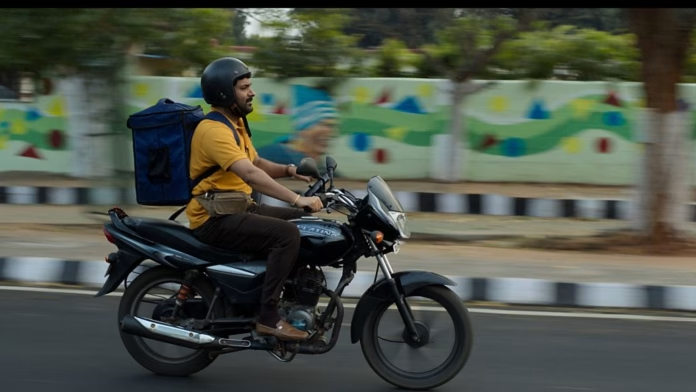Zwigato is a powerful portrayal of the struggles and challenges that gig economy workers face in India. It highlights the gritty reality of those who work tirelessly to make ends meet and support their families. The film is a stark departure from Kapil Sharma’s typical on-screen persona as a rambunctious host of a popular comedy show. Instead, he portrays the character of Manas, a gloomy food delivery rider, with nuance and depth.
The film begins with Manas weaving in and out of traffic on his bike, trying to deliver enough food orders to earn a bonus at the end of the day. The anxiety of a precarious present and the promise of a better future hang in the balance. The film’s portrayal of Manas is a sobering reminder of the realities of gig work, where every moment counts, and there is no guarantee of a stable income.
Samir Patil, who Co-wrote Zwigato, said, “There is optimism [among the gig workers] despite the daily struggles. But we cannot fall into the trap of romanticising it. Nor can we ignore the fact that so many delivery riders feel that a better job is around the corner,” he says. “There is also a heart breaking sense that they are on their own and have very low expectations from the [delivery] platforms or the government”.
Nandita Das, Director of zwigato ,said, “The film is not only about trying to decode the world of algorithms and ratings. It’s also about four days in the life of a family. And the context is filled with disparities of gender, caste and religion and our prejudices.”
Manas’ journey is interspersed with the stories of his colleagues who are also struggling to make a living in the gig economy. They are everywhere, but they are invisible, like a silent swarm of India’s booming gig economy. They work tirelessly, picking up and delivering orders, thronging outside noisy restaurant kitchens, and risking accidents and injuries while navigating chaotic roads.
The film also explores the harsh realities of the caste and class hierarchy in India. Manas and his colleagues take high-rise elevators meant for “service” staff, a euphemism for the menial help in India’s punishing caste and class hierarchy. They work long hours, with no job security, no benefits, and no guarantee of a decent living wage.
Back home, Manas’ life is a constant struggle. He lives in a two-room shanty with his wife, two children, and a bed-ridden mother. They are always anxious about their precarious present and the hope for a better future. The film shows how gig work has produced new opportunities for millions of Indians, but it has also bred newer exploitations.
One of the film’s most poignant moments is when Manas’ wife takes up a job as a cleaner in a mall to supplement their earnings. He is uncomfortable with this and feels it is beneath her, but he has no other choice. The film highlights the impact that gig work has on families and the choices they have to make to survive.
Zwigato is a timely reminder of the struggles that gig economy workers face in India and around the world. It is an unsentimental, even-handed look at the lives of those who toil to make ends meet, and it is a powerful call to action for governments, companies, and individuals to take a closer look at the exploitative practices that have become all too common in the gig economy.




